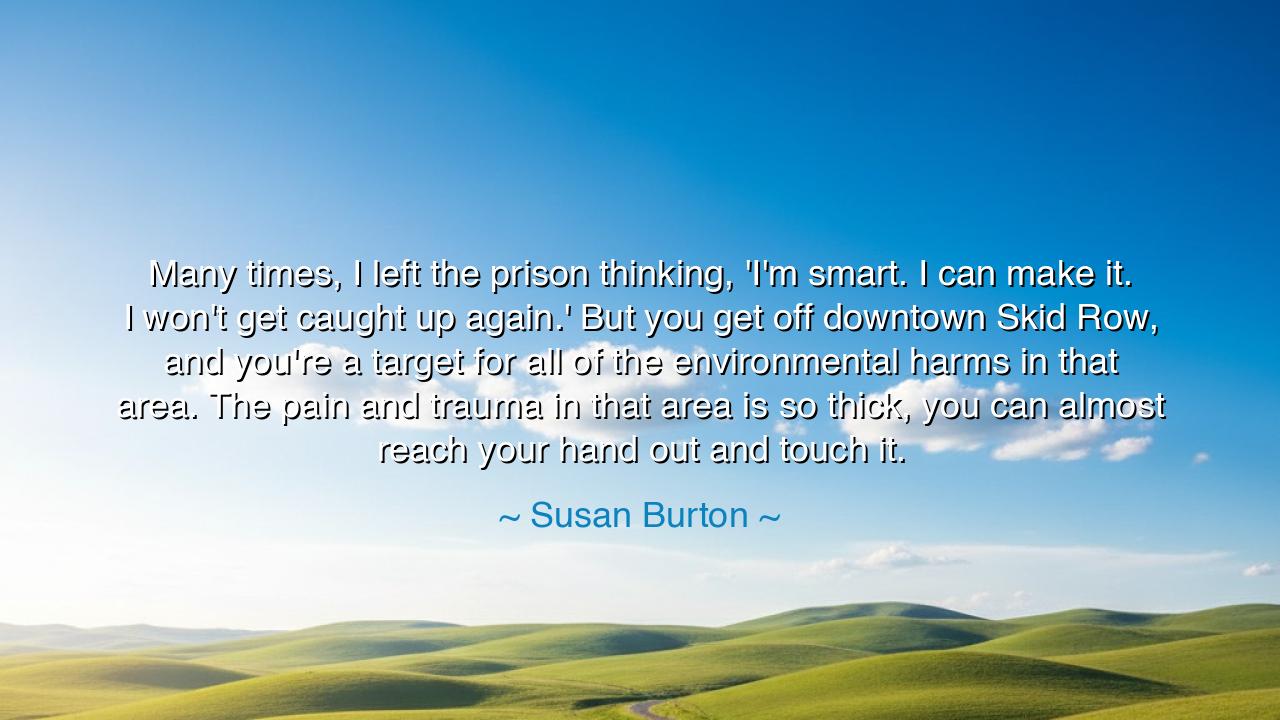
Many times, I left the prison thinking, 'I'm smart. I can make
Many times, I left the prison thinking, 'I'm smart. I can make it. I won't get caught up again.' But you get off downtown Skid Row, and you're a target for all of the environmental harms in that area. The pain and trauma in that area is so thick, you can almost reach your hand out and touch it.






The words of Susan Burton fall upon the heart like the weight of centuries: “Many times, I left the prison thinking, ‘I’m smart. I can make it. I won’t get caught up again.’ But you get off downtown Skid Row, and you’re a target for all of the environmental harms in that area. The pain and trauma in that area is so thick, you can almost reach your hand out and touch it.” In these words lies not only her own struggle, but the cry of countless souls who emerge from captivity carrying hope, only to find themselves ensnared once more in the cruel web of poverty, addiction, and despair. This is not merely one woman’s lament—it is the testimony of a system, and the teaching of a battlefield that many do not see.
When Burton speaks of prison, she speaks not only of iron bars, but of the prison that follows beyond the gates. She emerges with resolve, declaring within herself that she is smart, that she will rise above her past. Yet the world she returns to—Skid Row, a place where suffering hangs in the air like smoke—pulls her back into the shadows. This is the truth few dare to admit: it is not always weakness of will that binds a person to their chains, but the weight of their surroundings, the landscape of trauma and harm that presses upon them from every side.
The ancients understood this wisdom. Consider Odysseus, who after years of war and wanderings longed only to return home. Yet even upon reaching his shores, he found his halls infested with suitors, his household in disarray, his peace stolen. He had survived seas and monsters, but the trials of home were no less treacherous. So it is with those who leave the prison walls—they are not freed into peace, but into a world that tests them again, often more mercilessly than before. To triumph, they need not only courage, but sanctuary.
The pain and trauma Burton describes are not invisible—they are thick, palpable, almost tangible. One can imagine stepping from the prison bus onto those streets and feeling it like a fog, creeping into the lungs and soul. The suffering of many becomes the inheritance of the one, and thus the cycle renews. Here is the tragic truth: without support, without healing, the newly freed are set not upon a clear road, but upon a field mined with sorrows, where each misstep drags them back to captivity.
Yet Burton herself is a living beacon. From her suffering was born her mission: to create safe houses for women leaving prison, to offer them not the poisoned air of Skid Row, but the clean breath of hope. Through her organization, A New Way of Life, she forged what the state and society often refused—a sanctuary of healing, where women could step not into trauma, but into community and restoration. She turned her own scars into a torch, lighting the path for others.
We must learn from her witness. The lesson is clear: environment matters. A heart may be strong, but if it is planted in poisoned soil, it withers. If we desire true freedom for ourselves and for others, we must create spaces that nurture healing, surround ourselves with those who uplift, and labor to cleanse our communities of the fog of despair. No one rises alone; all are shaped by the ground they walk upon.
Therefore, let this be the action for all who hear: when you see the wounded, do not only tell them to be strong—help cleanse the air they breathe, the streets they walk, the burdens they bear. Build communities of refuge. Offer a hand not just in word, but in shelter, opportunity, and steadfast presence. And in your own life, when you walk through places thick with sorrow, guard your spirit, seek the clean winds of hope, and help others to do the same.
So remember the teaching of Susan Burton: the will to rise is sacred, but it must be met with a world that allows it to flourish. Let each of us become builders of such a world, so that when the captives step into freedom, they will not sink back into shadows, but walk boldly into the dawn.






AAdministratorAdministrator
Welcome, honored guests. Please leave a comment, we will respond soon